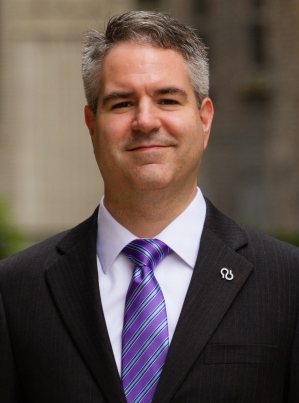 |
Keith Fargo, Ph.D., Alzheimer's Association Director of Scientific Programs and Outreach
What will be the top three issues at your Alzheimer's Association International Conference (AAIC 2014) from 12 to 17 July 2014?
The entire gamut of research into Alzheimer’s disease and related dementias – from basic science at the molecular and cellular level to treatment and prevention trials in people – will be covered at the Alzheimer’s Association International Conference 2014 in Copenhagen. Three of the most important topics are:
1) Research into the various factors the influence risk for Alzheimer’s disease and other dementias, and also into how we might reduce risk, better treat, and even prevent the disease.
2) Methods for early detection of Alzheimer’s disease and other dementias, including imaging of the well-known brain proteins (beta amyloid and tau) that are associated with Alzheimer’s and other brain diseases, and also detection of them in body fluids. Plus several other simpler, less invasive and less expansive methods that are in the early stages of research.
3) Investigations into the basic biology of Alzheimer’s disease and related dementias, to give new insights into the causes and potential new treatments and prevention strategies.
AAIC provides the Dementia Care Research and Practice Track. What is it about?
The Dementia Care Research and Practice Track at the Alzheimer’s Association International Conference 2014 in Copenhagen is a special 2-day course of sessions within the conference comprised of lectures, small group discussions, podium presentations and posters specifically designed to be informative for professionals involved in caring for people with dementia and their families. The track includes sessions covering dementia care research, and also how such research is translated into everyday practice. You can find out more about this and other AAIC 2014 program tracks here.
For those who cannot come to Copenhagen, can they follow AAIC 2014 remotely?
Certainly, it is best to attend AAIC in person. However, if that is not possible this year, there will be live updates to our website at www.alz.org/AAIC throughout AAIC 2014. In addition, many news outlets publish stories about AAIC during and after the conference. Registrants, as well as non-attendees, can purchase a package of the conference recordings. Three different packages are available. In some cases, the packages include audio recordings synced with PowerPoint presentations from speakers who have granted us permission to use their slides. An order form will be available online during and after AAIC on our website .
Why did you choose Copenhagen for AAIC 2014?
The Alzheimer’s Association and its advisors chose each city by evaluating a variety of factors. These include the relative ease of traveling to and from the city, number of hotel rooms at reasonable rates, convention center space and facility rental, local involvement of the Alzheimer’s research community, public relations and news opportunities, and financial considerations. We’re very happy to be in Copenhagen this year. We plan to return to the United States for AAIC 2015.
What are the main challenges for the Alzheimer's Association today?
Currently there are more than 5 million people with Alzheimer’s disease in the United States and 35 million worldwide. These numbers are expected to skyrocket to as many as 16 million and 115 million people respectively by mid-century. The potential of earlier diagnosis and the development of better treatments may significantly change the experience of Alzheimer’s for millions of people. In the meantime, the cost of care will rise exponentially for all societies. These factors will provide unprecedented challenges and opportunities to the Alzheimer’s Association over the coming years.
The Alzheimer’s Association is a global leader across Alzheimer’s and dementia advocacy, research and support. We are committed to enhance and strengthen this global leadership position as well as expand the depth, breadth and pace of the Alzheimer’s movement. Our mission is to eliminate Alzheimer’s disease through the advancement of research; to provide and enhance care and support for all affected; and to reduce the risk of dementia through the promotion of brain health. This is in service of the Association’s vision, which is a world without Alzheimer's disease.
To achieve that vision, the Alzheimer’s Association will:
o Accelerate progress in global Alzheimer’s and dementia research by increasing funding, engaging more people in Alzheimer science priorities, and leading global efforts to advance key and emerging research issues.
o Enhance care and support by being an early and ongoing point of contact for people diagnosed with Alzheimer's disease, either directly or through a caregiver.
o Advance public policy by securing governmental action to increase federal research investment and implement coordinated nationwide state policy priorities.
o Increase the momentum of the Alzheimer’s disease movement and concern about Alzheimer’s disease as a critical public health issue.
The Alzheimer's Association is the world's leading voluntary health organization in Alzheimer's care, support and research. The Alzheimer’s Association works on a global, national and local level to enhance care and support for all those affected by Alzheimer’s and other dementias. The Association advances the understanding of Alzheimer's through their peer-reviewed research grant program, which has awarded over $315 million to more than 2,200 scientists since 1982. The Alzheimers' Association International Conference (AAIC) will take place from 12 to 17 July 2014 in Copenhagen. www.alz.org, www.alz.org/aaic